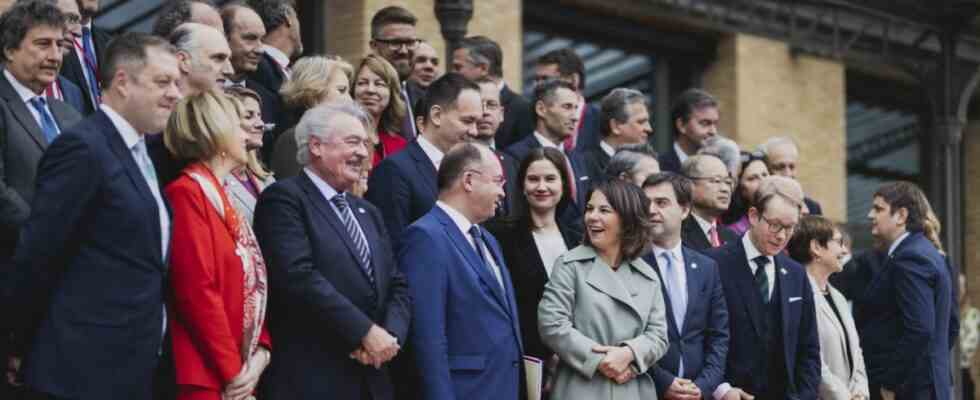Federal Foreign Minister Annalena Baerbock (Greens) launched the support platform for the Republic of Moldova after her visit to Ukraine’s small neighbor in March. At that time, hundreds of thousands of people fled from the fighting, tens of thousands found refuge in the houses of the approximately 2.6 million inhabitants of the former Soviet republic. The aim of the first ministerial conference in Berlin, which Baerbock organized together with France and Romania at the beginning of April, was to prevent the state from collapsing.
This has worked so far, but on the day of the platform’s third meeting on Monday in Paris, the situation is more tense than ever. France’s Foreign Minister Catherine Colonna said Russia has drastically cut gas supplies to the pro-Western government in Chisinau, most recently by half. Also, because of the Russian bombardment of civilian infrastructure in the Ukraine, no exports of electricity are possible from there.
The country’s only power plant is in the breakaway province of Transnistria, which is largely controlled by Russia. Moldova has to get electricity from Romania, which is now possible – but you have to pay market prices for it. “Many people in Moldova will not be able to pay their bills this winter without help,” Moldovan President Maia Sandu said in Paris on Monday. She accused Russia of “hybrid warfare” against her country.
On average, Moldovans earn only 5100 euros a year
The head of state is in a difficult position. People in Chisinau have been demonstrating against their government for weeks. They are apparently paid in part for this, but at least they are incited by disinformation from oligarchs loyal to Russia who receive money from Moscow, according to Ilan Schor, who has been convicted of corruption. They blame the government for inflation, which is more than 35 percent, and the electricity and gas prices, on which Moldovans currently have to spend up to 70 percent of their income – the average annual income is 5,100 euros, the republic is one of the poorest countries in Europe. In addition, the traditional sales markets for agricultural products in Russia and Ukraine have collapsed.
“We have no right to indulge in fatigue or fatigue,” French President Emmanuel Macron said at the conference on Monday. Helping Moldova is a duty and a fair recognition of what the country is also doing for Europe. According to French Foreign Minister Colonna, the aim of the meeting in Paris was to help Moldova deal with the consequences of the war and survive the winter; further financial aid from the more than 30 participating countries was expected.
According to information from the German delegation, Baerbock pledged an additional 32.35 million euros from the federal government; the majority, at 28.7 million euros, comes from the budget of Development Minister Svenja Schulze (SPD). The money should be used, among other things, to strengthen renewable energies and energy efficiency and help Moldova to get out of its dependence on energy from Russia. In addition, the municipalities are to be helped in supporting refugees from Ukraine.
Moldova has been an EU accession candidate since June
At the conference in Berlin in April and another meeting in July in Bucharest, Moldova had received pledges totaling around 1.2 billion euros. Some of these are budget support, project funds, low-interest loans and long-term support, for example in the energy sector. Some of the money has not yet been fully withdrawn, but according to all estimates it will not be nearly enough. The energy subsidies could bankrupt the state.
At the same time, Colonna announced that he wanted to support Moldova with a work program for reforms in further steps on its long way “into the big European family”. In June, the EU declared Moldova to be a candidate for accession together with Ukraine. The European perspective is the government’s best argument against its pro-Russian opponents, but only if it can control the cost of living for the population. Otherwise, it is questionable whether the fourth conference will be able to take place in Chișinău next year as planned. Back in March, when Baerbock visited Sandu in Chisinau, the presidential palace there was not heated to save energy.

